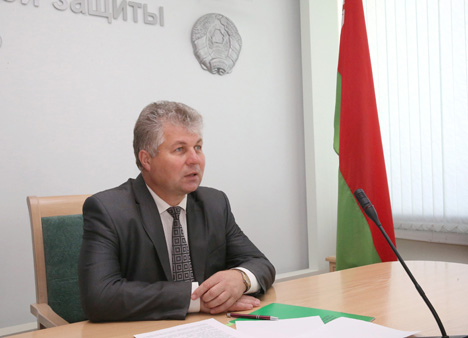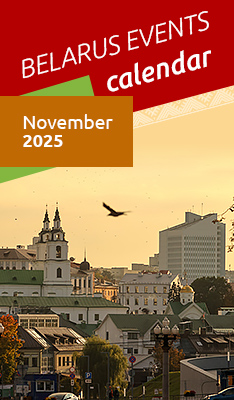News & Events in Belarus
Belarus’ migration policy hailed as open, compliant with human rights standards
 MINSK, 15 November (BelTA) – Belarus’ migration policy is based on the universally recognized principles and norms of international law, is open, and is aimed at maintaining peace and accord in the country through protection of human rights and freedoms, Deputy Labor and Social Security Minister Alexander Rumak said at the international conference Migration and Demographic Development of the Republic of Belarus and Neighboring Countries, BelTA has learned.
MINSK, 15 November (BelTA) – Belarus’ migration policy is based on the universally recognized principles and norms of international law, is open, and is aimed at maintaining peace and accord in the country through protection of human rights and freedoms, Deputy Labor and Social Security Minister Alexander Rumak said at the international conference Migration and Demographic Development of the Republic of Belarus and Neighboring Countries, BelTA has learned.
The country has established its national migration legislation that regulates different areas, including labor migration. Migrants get assistance with social integration and adaptation. The Belarusian people show tolerance towards the foreign nationals and refugees living in the country, Alexander Rumak noted.
Migration is one of the key population-related issues today. It is viewed as a complex demographic process involving almost all the aspects of the social and economic life of the society. Globalization, uneven population growth, socioeconomic differences among the countries, and military conflicts lead to increasing migratory flows that cross the national boundaries. A country cannot achieve sustainable development without a comprehensive analysis of the specific problems of migration, external and internal.
“Migration affects the quality and quantity of workforce, the jobs market, and the demographic situation. By granting permanent residency permits, a country can increase its population, especially in demographically depressive regions. It is a common international practice to attract highly skilled specialists from abroad. At the same time, unregulated and uncontrolled migration can serve as a catalyst for social upheavals, worsen the crime situation and hurt the economy,” Alexander Rumak said.
He believes that people’s tolerance towards migrants and migration issues depends directly on the impact that the migration has on the life of every individual.
Elena Kasko, UNFPA Assistant Representative in Belarus, said that, according to the United Nations estimates, there were 247 million migrants in the world as of the beginning of 2016, which is 3.4% of the global population. “Belarus is an active participant of the global economic system and the international labor exchange, so study and analysis of migratory processes will be gaining increased importance as a precondition for successful social and economic development of the country,” Elena Kasko noted. She expressed hope that the conference will make a considerable contribution to the understanding of the internal and external migration trends in Belarus and in the Eurasian region in general.
The international conference Migration and Demographic Development of the Republic of Belarus and Neighboring Countries is running in Minsk on 15-16 November. The forum has been organized by UNFPA, scientific and educational organizations of the Labor and Social Security Ministry of Belarus, and also the Institute for Socio-Political Research of the Russian Academy of Sciences. The conference is held under the project “Support for the national demographic security program of the Republic of Belarus” funded by UNFPA and the Government of the Russian Federation. Attending the conference are researchers from 10 countries (Belarus, Brazil, Hungary, Vietnam, Portugal, Russia, the United States, Turkey, Finland and South Africa). The conference participants are set to discuss the contemporary migration crisis and demographic security, migration policy in Belarus and in the Eurasian region, the interconnection between migration and health of the population.







 print version
print version make home page
make home page add to bookmarks
add to bookmarks

